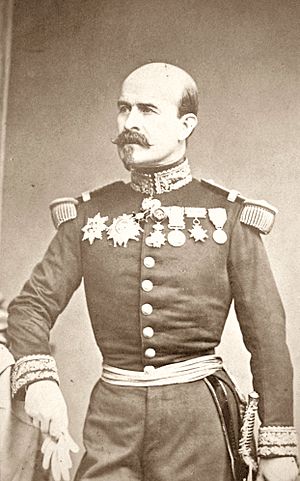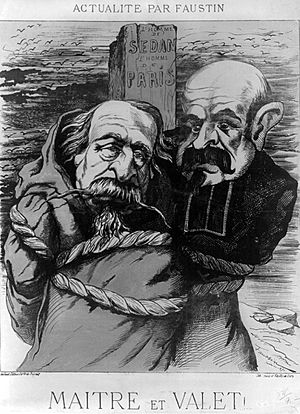Louis-Jules Trochu facts for kids
Quick facts for kids
Louis-Jules Trochu
|
|
|---|---|

Louis-Jules Trochu
|
|
| Interim French Head of State Prime Minister of France |
|
| In office 4 September 1870 – 13 February 1871 |
|
| Preceded by | Emperor Napoleon III (Head of State) Charles Cousin-Montauban (Prime Minister) |
| Succeeded by | Adolphe Thiers (President of France) Jules Dufaure (Chief of Government) |
| Personal details | |
| Born | 12 March 1815 Le Palais, France |
| Died | 7 October 1896 (aged 81) Tours, France |
Louis-Jules Trochu (12 March 1815 – 7 October 1896) was an important French military leader and politician. He became the de facto (which means "in practice" or "unofficial") head of state for France. This happened when he led the Government of National Defense from September 4, 1870, until he resigned on January 22, 1871. He was a key figure during a very difficult time for France.
Contents
Early Military Career
Louis-Jules Trochu was born in Le Palais, a town on an island called Belle-Île-en-Mer in France. He studied at the famous military school St. Cyr. After graduating, he joined the Staff Corps in 1837. He quickly moved up the ranks, becoming a lieutenant in 1840 and a captain in 1843.
Trochu served as a captain in Algeria under a famous general named Marshal Bugeaud. He showed great bravery in battles like Sidi Yussuf and Isly. Because of his courage, Marshal Bugeaud made him his special assistant, called an aide-de-camp. Trochu was promoted to major in 1845 and then to colonel in 1853.
Important Wars and Promotions
Trochu fought bravely in the Crimean War, which was a big conflict in the mid-1800s. He first served as an aide-de-camp to Marshal St. Arnaud. Later, he became a commander of the Légion d'honneur, which is a very high award in France. He was also made a general of division.
He continued to show his skills as a leader in the Italian campaign of 1859. There, he commanded a division and earned the Grand Cross of the Légion d'honneur. This was an even higher honor, showing his great achievements.
Role in the Franco-Prussian War
In 1866, Trochu worked at the war ministry. He helped plan how to reorganize the French army. The next year, he secretly published a book called L'Armée française en 1867. This book talked about how the French army needed to change. It became very popular, selling many copies.
However, his book made him unpopular with the Emperor's court. When the Franco-Prussian War began in 1870, he was not given a command in the field. But after France suffered some early defeats, the Emperor changed his mind. On August 17, Trochu was made governor of Paris and commander-in-chief of all the forces defending the capital. This included a huge number of soldiers and guards.
Defending Paris
Trochu worked very hard to prepare Paris for defense. During the Siege of Paris, he was very good at defending the city passively. This means he focused on holding the city rather than attacking.
When a revolution happened on September 4, he became the president of the Government of National Defense. He kept his other roles too. Trochu had a "plan" for defending Paris, which made people hopeful. However, the attacks made by the French army from inside the city were not successful.
Trochu had famously said that the governor of Paris would never surrender. But when it became clear that surrendering was unavoidable, he resigned as governor of Paris on January 22, 1871. He kept his role as president of the government until after the armistice (a ceasefire) in February.
Later Life and Retirement
After the war, Trochu was elected to the National Assembly, which is like a parliament. He represented the Morbihan area. In October, he became president of the general council for Morbihan.
In July 1872, he decided to leave political life. The next year, in 1873, he retired from the army. He wrote a book in 1873 called Pour la vérité et pour la justice. In this book, he explained and defended the actions of the Government of National Defense. In 1879, he wrote another book, L'Armée française en 1879, which was an update to his earlier work.
Louis-Jules Trochu passed away in Tours.
Decorations
- Légion d'honneur
- Knight (1844)
- Officer (1854)
- Commander (1855)
- Grand Officer (1861)
- Médaille Commémorative d'Italie (1859)
- Médaille Coloniale with "Algérie" bar
- Knight of the Order of Leopold (Belgium)
- Grand Officer of the Order of Saints Maurice and Lazarus (Sardinia)
- Companion of the Order of the Bath (UK)
See also
 In Spanish: Louis Jules Trochu para niños
In Spanish: Louis Jules Trochu para niños
 | John T. Biggers |
 | Thomas Blackshear |
 | Mark Bradford |
 | Beverly Buchanan |


